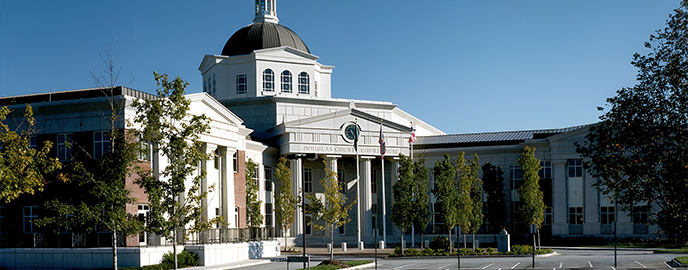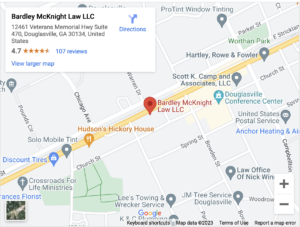Note: This content is for informational purposes only. Our law firm does not handle matters involving collaborative divorce.
The divorce process in Georgia can involve a lengthy and costly court battle. However, other options exist for couples who want to dissolve their marriage. If you and your spouse are willing to work together and be flexible in resolving your differences fairly and equitably, a collaborative divorce might be right for you.
A collaborative divorce can be a much less stressful way to resolve your differences during a divorce. Even though you and your spouse might have differences, maintaining a positive working relationship is essential if you have children. With the help of our Douglasville collaborative divorce attorneys, you and your spouse can avoid having a judge make decisions for you.
How Can a Divorce Lawyer Help With Your Divorce in Douglasville, Georgia

Divorces involve many different issues. Depending on your situation, you and your spouse might need to resolve issues related to property division, child custody, and spousal support. Whether you are dealing with a simple, uncontested divorce or a complex, contested divorce, collaboration benefits both parties.
A Douglasville divorce attorney at Bardley McKnight Law Divorce Lawyers help you explore all options. Collaborative divorces can be less stressful and result in divorce terms that benefit you and your family. However, they are not suitable for all parties, so we help you weigh the pros and cons to determine what is best for your future.
When you hire our top-rated Georgia divorce lawyers, you can trust that our lawyers will:
- Listen to you as you explain your situation, goals, and desired outcome
- Explain your divorce options and how those options may or may not achieve your desired outcome
- Analyze your financial situation to determine how child support and alimony impact your divorce
- Prepare and file all documents related to your divorce and appear with you at all court hearings
- Work with you to develop a strategy for a collaborative divorce to achieve a fair agreement for divorce terms
- Work with experts and professionals to mediate a fair divorce settlement
- Proceed to court and aggressively litigate your case, if necessary
Our Douglasville family law practice is centered on client satisfaction. We understand that you are going through one of the most challenging and emotional experiences of your life. Our legal team at Bardley McKnight Law Divorce Lawyers is here to help you by providing support, guidance, and legal advice so you can move forward with your life.
What Is a Douglasville Collaborative Divorce?
Collaborative divorce is a form of ADR (alternative dispute resolution). ADR is a way of resolving disputes without litigation.
Instead of going to court to argue their case before a judge, spouses work with lawyers and other professionals to negotiate a divorce settlement agreement. The cooperative nature avoids many of the downsides of divorce litigation.
A collaborative divorce can resolve all divorce issues, including:
- Child custody and visitation
- Property division
- Spousal support
- Child support
- Division of marital debts
The collaborative divorce process is voluntary. Both spouses must agree to collaborate to resolve their divorce. If either spouse does not want to collaborate to resolve their divorce, the divorce case moves forward through the traditional divorce process.
How Does a Collaborative Divorce Work in Douglasville, GA?
First, the spouses hire a Douglasville collaborative divorce lawyer. Each spouse must have a different attorney representing them throughout the process. The parties sign a collaborative divorce agreement outlining their agreement to work together to settle their divorce through alternative dispute resolution.
The parties work with their collaborative divorce attorneys to identify their goals and desired outcomes. Their attorneys develop strategies for negotiating agreements that achieve their client’s goals and protect their best interests.
The parties and their attorneys meet to discuss the divorce terms and negotiate a divorce settlement. The lawyers and spouses might meet several times throughout the collaborative divorce process. Additionally, the parties might hire one or more professionals to help them resolve their disputes.
Professionals and experts that could help spouses with divorce negotiations in a collaborative divorce include, but are not limited to:
- Accountants and financial professionals
- Real estate appraisers
- Financial planners
- Child custody specialists
- Psychologists and counselors
- Business appraisers and evaluators
- Estate planning professionals
- Parenting coordinators
Working with professionals and experts helps spouses discuss various solutions and options they might not have considered. With more information, spouses can make decisions with a focus on their future.
Once the parties reach an agreement, one of the attorneys drafts a divorce settlement agreement. The parties sign the agreement, which is filed with the court for the judge to consider.
The judge reviews the agreement to ensure it complies with the law and that the terms related to the children are in their best interest. The judge can change the terms of the agreement if it would harm the couple’s children.
What Happens if Spouses Cannot Agree in a Collaborative Divorce?
When spouses sign a collaborative participation agreement, they certify their willingness to settle their divorce without litigation. They also agree that they must hire new attorneys to proceed to court if the negotiations fail. Either party can hire a new Douglasville divorce lawyer, file a divorce petition, and argue the case in court.
Pros and Cons of a Georgia Collaborative Divorce
There are many advantages and disadvantages of collaborative divorces.
Benefits of a collaborative divorce include:
- Lower the costs and fees to obtain a divorce
- Reduce the stress and emotional toll of a divorce action
- Offers flexibility to design divorce terms that are best for all parties
- Maintain a positive relationship between spouses to co-parent
- Have more control over the decisions made regarding the divorce
- The collaborative divorce process is more private and confidential than a divorce through the court
- Reduce conflict, which benefits the spouses and their children
Even though the benefits of a collaborative divorce often outweigh the disadvantages, a collaborative divorce might not be the best option for all couples. For example, if the parties cannot agree on all issues, a collaborative divorce is not possible.
Parties unwilling to compromise or unable to communicate may not be able to negotiate a settlement. Furthermore, the collaborative divorce process might not be appropriate when there is a history of domestic violence.
What Are My Options if a Collaborative Divorce Is Not an Option?
If you have questions about the collaborative divorce process in Douglasville, talk with a family lawyer. An attorney evaluates your situation to advise whether a collaborative divorce might be possible.
You can file for divorce if your spouse does not want to enter a collaborative participation agreement. The divorce process in Georgia begins by filing a divorce petition. Then, the petition is served on your spouse.
You can file for divorce in Georgia on fault grounds. Fault grounds include:
- Adultery
- Impotence at the time of marriage
- Cruelty and abuse
- Abandonment and desertion
- Pregnancy by another man
- Alcoholism or drug addiction
- Conviction of a crime with a prison sentence of more than two years
- Fraud or force at the time of the marriage
- Insanity
With fault grounds, you must prove that your spouse is guilty of the specific grounds to obtain a divorce. It can be challenging to prove fault in some cases.
You can also file for divorce because the marriage is irretrievably broken, and there is no chance for reconciliation. The no-fault grounds do not require you to prove wrongdoing. Instead, neither spouse is to blame.
Your spouse has a specific time to respond to the divorce papers by filing an answer or other pleadings with the court. The law requires both spouses to attend a mandatory parenting seminar if they have children. You do not need to attend the seminar together.
If you and your spouse do not reach a settlement, the case proceeds with discovery, pre-trial motions, and a hearing. The judge could order mediation to help you and your spouse resolve some of your issues.
You and your spouse present testimony and evidence supporting your position at the trial. The judge hears the evidence and decides the issues based on the law and the evidence.
The downside of divorce litigation is time and money. However, allowing a judge to decide issues for your family is also a downside. The judge does not know you or your children, so their decisions might not benefit your family.
If you can resolve your disputes with your spouse outside of court, it generally produces better divorce terms.
Schedule a Confidential Consultation With Our Douglasville Divorce Lawyers
How do you get a divorce in Georgia? First, you talk with an experienced Douglasville divorce attorney. Contact Bardley McKnight Law Divorce Lawyers to meet with an attorney to discuss your divorce options.

